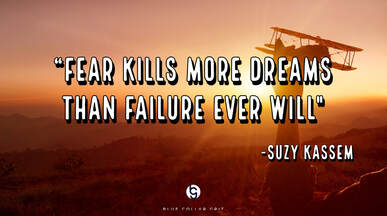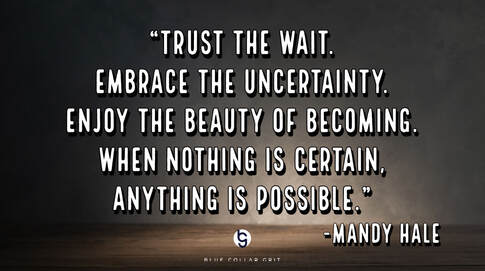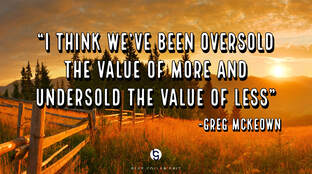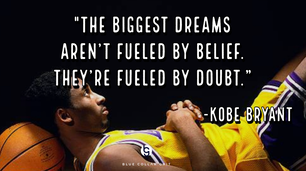Motivation AwarenessSpend enough time around competition and you’re bound to hear hundreds of different reasons people claim to be motivated. The business world is no different, the motivating factors vary drastically from one professional to the next.
As a general rule, we don’t really care too much about motivation as long as it leads to the result we are looking for. Whatever works for you, works for us: to prove others wrong, to elevate your status, to receive recognition, for fear of failing, for fear of being embarrassed, because others are counting on you, because it’s your job, or to demonstrate your love for those on your team What I think we fail to understand is that motivation is just sport code for purpose. And, far too many people rely on unhealthy motivation to obtain short-term results. Why Should We Care? Why you do things matters. Even if the results look the same, the purpose - motivation - behind why we do them isn’t necessarily the same. And, I don’t believe the results are truly the same. I’ll use the example of a student preparing to take a big test since it’s in the world I live in and something virtually everyone has a firsthand account of. If the student is motivated by a fear of failure, she may commit an inordinate amount of time to preparing for the test. In order to have this time for studying, she had to compromise time spent somewhere else. The stress she experiences and anxiety suffers as a result of her motivation, most would agree, are not positive for her. Of course, motivation from fear could also lead her to shutting down and doing nothing to prepare since she expects the worst. If the student is motivated by the desire to elevate her status by appearing smart to her peers, she may cheat. The process of preparing is almost viewed as a negative, detracting from her true genius. Cheating seems logical, which clearly robs her of the growth and experience of gaining new information and challenging herself. But, if elevating status and the opinions of others is paramount, then the very best result is all that matters. If the student is motivated by the duty to be the best she can because she is grateful for the opportunity that she has to learn and grow, she will likely prepare extensively. She would probably maintain a healthy balance however since she likely carries this same feeling of responsibility into other areas of her life. She would fully embrace the process of doing her best on the test. If the student is motivated by the love of learning as a means to help others she would also likely dive head first into the preparation and process necessary to do her very best. She may also find herself expanding her understanding beyond the test, realizing that her ability to help others likely wouldn’t be relegated to only the material on the test. She would be searching for understanding so that what she was learning could be applied to help others. A good grade on the test could happen for all four motivations. The same short-term outcome. But, the motivation clearly changes the process, which changes the long-term result. REAL TALK - Action Steps In his book, Think Like A Monk, Jay Shetty shares Hindu philosopher Bhaktivinoda Thakura’s description of the four fundamental motivations. As Jay explains, ‘these four motivations drive everything we do.’
If you consider your purpose for doing anything - from taking out the trash to loving your spouse - one of these motivations is driving the action. Clearly we want to live in duty and love, but we all will find ourselves in fear and duty from time to time. Be aware. Be intentional - as much with your motivation as you are with your desired outcome. For more information on building excellence in your teams, visit us at www.bluecollargrit.com. We would love to know how we could help!
1 Comment
Are You Giving or Trading?The results never tell the whole story. Of course, the process we choose to undertake is important.
But, our purpose matters … a lot. Have you ever been around someone that does something strictly to evoke a desired response from another person? Lencioni calls this ‘politics’ in The Five Dysfunctions of a Team for obvious reasons. When we act with no expectation of anything in return, we are giving. Whether that be giving our time, our thoughts, our feelings, our expertise, our advice or a helping hand, a pencil, a battery, a book. When we act expecting anything in return, we are reducing the act to a transactional trade. Trading my time for your time, my thoughts for your understanding, my feelings for your sympathy, my expertise for your admiration, my help for your help, my pencil, battery, or book for a debt you will owe me later. The tangible results are identical. The fabric of those results is quite different. Why Should We Care? Are you truly serving those you lead, or those you love? Or, are you acting under the guise of service in order to get what you want? I think the latter is much more common than the first. To truly give, we have to surrender. We must surrender our desire, need for affirmation, even adulation of others. Sure we don’t come out and say that’s what we are looking for. What would people think? It’s much easier to stay in the shadows with our mask on pretending to be what everyone wants us to be. We must surrender our wish for acceptance and worth based on our accomplishments and recognition. Is there anything more difficult to surrender than the desire to be liked or placed on a pedestal for being ‘the best’? Giving requires no acceptance. It measures no worth. To trade, we need not offer the same sacrifices. We readily trade our values and behaviors for the affirmation and acceptance of others. Our beliefs are a willing exchange for recognition and adulation. REAL TALK - Action Steps Unfortunately, we don’t like surrendering. Therefore, we trade a whole lot more than we give. Detaching those strings of control are a major step in our leadership journey. Here are a few ideas to get a little closer to surrendering.
Plenty of successful leaders have invested heavily in the trade system. Many get remarkable results. I’ll always question the true impact one can have as a trader though. Whereas the impact of a giver will never be in question. For more information on building excellence in your teams, visit us at www.bluecollargrit.com. We would love to know how we could help! Go Play“Go play.”
It was parenting 101 in the ‘80s, and my parents were well versed in it. So we played. And, it didn’t matter what we played. Of course, we played sports like football, basketball, baseball, and kickball. But, we also played some non-conventional games like tag, jump over the creek, rocks on the roof, bike races, hide and seek, and a hundred other made up games. This desire to just ‘play’ is something I still enjoy today. I’m not as enamored by basketball, for example, as I am about the continued opportunity to try, fail … to compete - sometimes against others, but often against myself. Why Should We Care? The game isn’t the point. The competition isn’t even the point. In leadership we often hear young people advised to chase their passion. While I understand this advice, there are inherent problems with it. The primary issue is that most people think of their passion as a thing they do like a sport, a profession, or a hobby. Passion isn’t a thing you do. Passion is an emotion evoked by the thought or action of doing something. Passion is much more about how you do something rather than what you are doing. Passion is entrenched in the process, not the game or the result. As leaders we need to begin helping people discover the process that produces their passion. If for no other reason than passion casts out fear. When passion is present our concern with failing, being embarrassed, or not being enough are gone. Consider the example of play. Those concerns don’t even exist under the pretense of play. They simply become an aspect of play that are not only accepted, but enjoyed and embraced. REAL TALK - Action Steps Play brings about passion. Finding a process beyond play that inspires passion is more challenging. It requires reflection and self-awareness along with a lot of trial and error. It’s well worth the struggle.
When we love the process we are undertaking we will endure immense struggle in order to simply keep doing it. No reward needed. The process and the passion are the reward. For more information on building excellence in your teams, visit us at www.bluecollargrit.com. We would love to know how we could help! I Doubt ItWhen my son, Gabe, found out he was going to be trying out for his first AAU basketball team, he was excited. When he found out the team was the North Coast Blue Chips he was nervous. The Blue Chips were Bronny James’ team. His dad, LeBron, had just relocated to Cleveland so they were creating a team in Ohio for Bronny to be able to compete.
Gabe loved basketball, but had never played competitive basketball. He had been in the gym with me for practices almost everyday. He had spent hours in the basement or in our driveway improving his skills, but had really only played one year of organized basketball. As a ten year old, Gabe was already dedicated to getting better. He practiced everyday, usually spending a few hours each day practicing the game he loves. Upon learning of the tryout opportunity in front of him, Gabe - not mom or dad - bumped that up to 3-4 hours each day. He was obsessed about being as good as he could be at the tryout. He knew he had worked hard to that point, harder than probably 95% of kids his age. Yet, it wasn’t the confidence from his previous work that pushed him to double down on his commitment. It was the doubt that he wasn’t good enough to make the team. Why Should We Care? We often think that our work and drive to excel is rooted in our purpose and our belief in ourselves. Remember, you can be anything you want to be according to your mom and dad. But the truth is that our drive isn’t nearly as connected to our confidence as it is our fears. Gabe wasn’t driven to work three to four hours per day because he knew could be great. He was willing to put that type of work in because he was afraid he wasn’t good enough. The same is likely true for the hardest workers on your team. Those driven to work are fueled far more by doubt than they are by confidence. They are on a constant mission to prove themselves, unsure if they are good enough. This uncertainty provides the tightrope anyone seeking excellence must walk. Too much doubt and we are crippled by a lack of confidence that leaves us unable to perform. Too little doubt and we become over confident and soon begin to lack the value of the work we once put in. Some reflection will lead you to the same discovery. Those times when you went all in, gave every last thing you had, were usually times you weren’t sure you could get the job done. Doubt was present and you needed to do everything you could to give yourself a chance. And, when you came through, confidence and belief grew. Fulfillment was experienced. REAL TALK - Action Steps Here are a few ways to maintain a healthy level of doubt in your pursuit of excellence.
Doubt is so often viewed as a negative thought, but like virtually everything, it is what you make of it. It’s not the thought of doubt that matters, but our response to it. With an underlying faith that we will persist and find a way, doubt can provide the very motivation for your foundation of work. For more information on building excellence in your teams, visit us at www.bluecollargrit.com. We would love to know how we could help! |
About bcI'm a teacher, coach, and parent seeking excellence while defining success on my own terms. Archives
July 2024
Categories |





 RSS Feed
RSS Feed